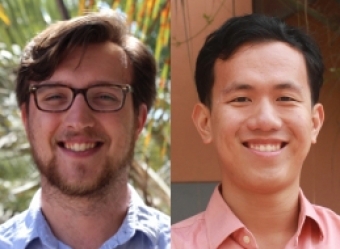
Department of Chemical Engineering graduate students, Koty McAllister, Rawlings Lab, and Chad Wangsanuwat, Dey Lab, have been awarded a CSP Technologies Teacher-Scholar Fellowship for 2019-20.
“As a part of the award, Koty and Chad will each co-teach an undergraduate course with a faculty mentor this year (to be determined),” said Scott Shell, Professor and Vice Chair of Graduate Affairs.
Wangsanuwat said he is honored to be the recipient of the fellowship because of the unique opportunity that allows him to teach under the guidance and mentorship of a Chemical Engineering faculty member, which will ultimately help him to become a more effective instructor.
“I’m excited to teach undergraduate students in a focused environment for an extended period of time,” Wangsanuwat said. “I think my science communication ability will improve a lot, which is very crucial for both my graduate and future careers.”
McAllister similarly feels honored by the opportunity for the teaching opportunities.
“While the recognition and funds are great, the opportunity to co-teach is far more consequential to my future academic goals,” McAllister shared. “I have always found the act of teaching extremely fulfilling, and I am looking forward to contributing to the department pedagogy.”
The fellowship also provides Wangsanuwat more flexibility to continue his research that focuses on studying epigenic inheritance at a single cell division resolution.
“Trying to understand how one cell divides into two cells of two different cell types, since my research focus is rooted in biology,” Wangsanuwat said. “It will be very cool if I can tie it to the class I teach.”
As with most researchers, Wangsanuwat understands that there is always a quest to resolve unanswered questions, and a variety of complex obstacles to overcome.
“It is fascinating that we all come from one single cell, and how that one cell divides and differentiates into many cells capable of performing various functions,” said Wangsanuwat. “Understanding the process of cell division is like understanding the nature of our very existence.”
McAllister’s research involves control theory, optimization, and computational methods, and the potential opportunity to teach any course that incorporates these areas connects his research to this fellowship.
“My research focuses on improving the theoretical results and algorithms for closed-loop, or reactive, production scheduling. To this end, we utilize a unique approach – casting the closed-loop scheduling problem in a common supervisory control framework known as model predictive control (MPC).
“This framework allows us to draw upon the set of insights, tools, and theoretical results already present in the MPC community for the dynamic behavior of a control algorithm. Adapting these theoretical results from control theory to scheduling provides capabilities in analysis previously unavailable to the scheduling community, particularly with regard to disturbances. This improved theoretical understanding is expected to guide further algorithm development and increase the efficacy of closed-loop scheduling implementation in industry.”
The most challenging part of McAllister’s research is to find the ideal balance between modifying scheduling problems to fit control theory and expanding control theory to cover scheduling problems.
“One of the most interesting parts is adapting control theory to scheduling problems. This area is largely unexplored, and provides a blank slate to experiment, create, and develop new results,” McAllister shared. “Many components overlap directly and are extremely useful for scheduling problems, but other components are distinctly different requiring new assumptions or properties unique to scheduling problems.”
Wangsanuwat acknowledges that working with Professor Dey has provided an influential platform for his research.
“I have a lot of flexibility to tackle the problems independently at my own pace, and Professor Dey is always available for quick, long, or very long meetings,” Wangsanuwat shared.
Similarly, McAllister has found that his approach to research has changed significantly over the past two years while working with Professor Rawlings.
“While I was initially focused on the simulation and optimization components of my research, Professor Rawlings constantly stressed the importance of incorporating theory, generalized results, and precise arguments in my work,” McAllister stated. “By incorporating these additional components, I have seen the quality and impact of my research improve dramatically.”
Wangsanuwat’s recommendation to incoming graduate students is to break down a problem into clearer terms.
“You can get overwhelmed and discouraged pretty easily when you are not sure whether what you have been working on for weeks, or months, will amount to anything,” Wangsanuwat shared. “It is very crucial to break the problems into smaller chunks and define clear objectives – I’m learning to be better at this.”
McAllister’s advice to incoming Chemical Engineering graduate students is to stay focused on the long-term.
“Success in grad school is far more self-determining than it may appear in the first few months,” McAllister said. “Selecting your adviser and project can be stressful, and there may be times when you're unsure if you made the right choice. But, ultimately, these decisions are rarely as important as what you choose to do with your time over the next several years.”
The department looks forward to the work of this skilled duo in their teaching, future research, and advances.
“Congratulations, Chad and Koty,” said Professor Shell. “We look forward to your contributions to our department pedagogy and wish you the highest success in your teaching roles.” ChE
Melissa Walker is the Communications Coordinator for the Department of Chemical Engineering.



